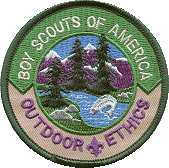
Outdoor Ethics

The foundation of Leave No Trace is an awareness and an attitude rather than a set of rules. It applies in your backyard or local park as much as in the backcountry. We should all practice Leave No Trace in our thinking and actions— wherever we go.
More information and training on Outdoor Ethics can be found on the Scouting America Outdoor Ethics webpage.
The following training slides provide a good overview of the outdoor code, outdoor ethics, and Tread Lightly!.
Fun Activity: Watch this video to see why you need to hang a "bear bag" when you are in the back country.
The Outdoor Code
For more than 60 years, the Outdoor Code has served as an aspirational statement of everything that a Scout seeks to achieve while in the outdoors.
As an American, I will do my best to:
- Be clean in my outdoor manners. We will clean up after ourselves using pack-it-in, pack-it-out techniques. We will avoid leaving graffiti, fire rings, camp gadgets, and other signs of our presence.
-
Be careful with fire. Fire is an important tool, but one that can be devastating if it gets out of hand. We think about the need for fire, how best to use it, and how to minimize its impacts.
-
Be considerate in the outdoors. We will think about others as well as ourselves and how our presence impacts them. We think about not just our impact on other humans, but also on wildlife and the environment.
-
Be conservation-minded. We will think about our impacts on the environment. We take steps to correct and redress damage to the environment.
Outdoor Ethics Awareness Award
Scouts interested in learning more about outdoor ethics and Leave No Trace should begin by exploring the Outdoor Ethics Awareness Award. The requirements are as follows:
- Recite from memory and explain the meaning of the Outdoor Code.
-
Watch the National Park Service Leave No Trace video.
-
Complete the Leave No Trace online course. Print the certificate.
-
Complete the Tread Lightly! online course. Print the certificate.
-
Participate in an outdoor ethics course, workshop, or training activity facilitated by a person who has completed the Scouting America outdoor ethics orientation course or is a Scouting America outdoor ethics trainer or master.
More info at: https://www.scouting.org/outdoor-programs/outdoor-ethics/awards/scouts-bsa/
Outdoor Ethics Action Award
There is another award that Scouts can earn - the Outdoor Ethics Action Award. This award challenges Scouts to take affirmative steps to improve their outdoor skills. The requirements for the Outdoor Ethics Action Award are as follows:
-
Do the following:
-
Unless already completed, earn the Outdoor Ethics Awareness Award.
-
Complete the Scouting America outdoor ethics orientation course.
-
Explain how each of the four points of the Outdoor Code guides your actions when outdoors.
-
-
Do the following:
-
Read Chapter 7 of the Boy Scout Handbook on Outdoor Ethics.
-
Teach a skill related to the Outdoor Code or Leave No Trace to another Scout in your troop or another Scouting unit.
-
-
Complete one of the following:
-
Successfully complete a term as your troop Outdoor Ethics Guide.
-
Participate in an outing that emphasizes the complete set of Leave No Trace or relevant Tread Lightly! principles. All members of the troop participating in the outing should use the outdoor ethics and the specific skills needed to minimize impacts from their use of the outdoors.
-
-
Follow the Outdoor Code, Leave No Trace, and Tread Lightly! principles on three outings. Write a paragraph on each outing explaining how you followed the Outdoor Code, Leave No Trace, and Tread Lightly! Share it with your unit leader or an individual who has completed the Scouting America outdoor ethics orientation course.
-
On a troop outing, help your troop on a service activity that addresses recreational impacts related to the type of outing. The project should be approved in advance by the landowner or land manager and lead to permanent or long-term improvements.
-
Participate in a report at a court of honor or similar family event on the service activity in Requirement 5.
More info at: https://www.scouting.org/outdoor-programs/outdoor-ethics/awards/scouts-bsa/
Being clean in our outdoor manners, careful with fire, and considerate means we can enjoy the outdoors in ways that do the environment no harm. For example, using the principles of Leave No Trace, you can hike and camp in an area while minimizing your impact. Being conservation-minded encourages the protection and thoughtful use of natural resources and doing your part through conservation service that improves the condition, and ultimately the health, of the land and environment.
The Troop Outdoor Ethics Guide is the Scout that trains and guides the Troop use Leave No Trace principles.
